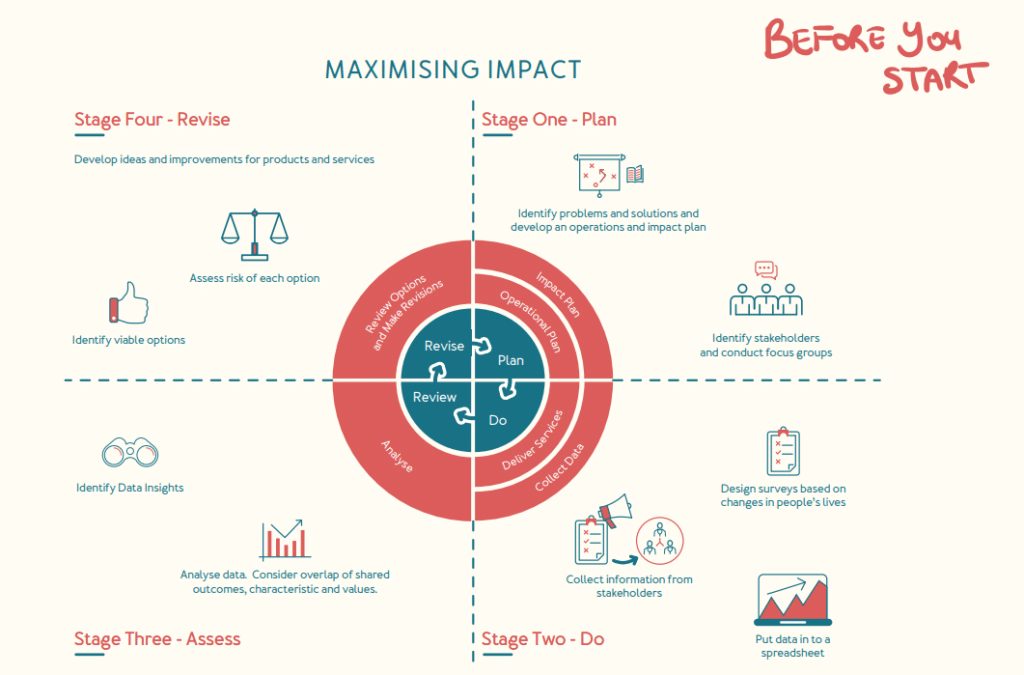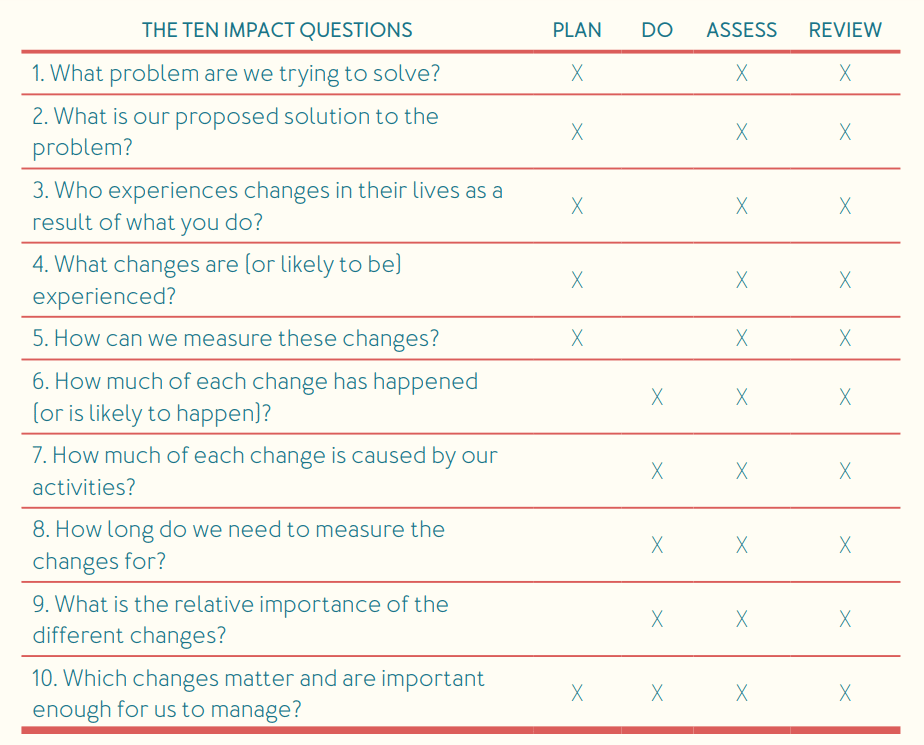Social Value Management Practice

What is Social Value Management Practice?
At Social Value UK we are dedicated to supporting people and organisations to develop Social Value Management Practice, aiming to meet internationally agreed standards of practice.
But what do we mean by Social Value Management Practice? If we break this down, social value is the value that people place on changes they experience in aspects of their wellbeing. Managing this means understanding what these changes are, measuring, recording, reporting on, and analysing them. It then means incorporating this social value information into decision-making processes for projects, activities, contracting and procurement, and overall organisational management with the aim of improving the positive value created and decreasing the negative.
The standards of practice we are talking about first and foremost align to the Social Value Principles which are internationally developed and recognised standards for social value management practice. The Social Value Principles help to guide our practice irrespective of the size of our organisations and operations, the industry, sector or purpose of our organisations work, and the level of our understanding of what social value is and how we impact this through what we do. The Principles of Social Value are a combination of accounting principles (for measurement) and management principles (for transparency and improved decision making). Each of the Principles of Social Value are adapted from existing disciplines such as financial accounting, sustainability reporting, evaluation and general social research. When combined, the principles create an accountability and decision-making framework for organisations who want to optimise impacts on wellbeing for all materially affected groups of people.
| Number | Principle Title | How it applies to Social Value Management Practice |
|---|---|---|
| 1 | Involve Stakeholders | guides us to understand who we impact, and to engage with, listen to, respect, and respond to them throughout our practice. |
| 2 | Understand What Changes | advises on best practice in understanding well-defined outcomes from the perspective of the people who experience them, how to map out change through a theory or chain of change or chain of events, and how to measure amounts of change that affected peoples are experiencing. |
| 3 | Value What Matters | is a unique part of the framework which defines value as the relative importance that people place on the changes in wellbeing that they experience or expect to experience. This means that for any accurate account of the social value, the ‘value’ needs to be informed by what people actually think, it is recognised that there is subjectivity to this. This valuation can use financial proxies or monetisation, but it does not have to. The important part is understanding the value from the perspective of the affected people. |
| 4 | Only Include What is Material | is about determining what information should be included or omitted so that reasonable conclusions can be made. This Principle requires assessing materiality from the perspective of those who are affected, based on the relevance and significance of the changes they experience. This differs from other accounting practices where materiality is assessed from the perspective of sustainability (financially or otherwise) of the organisation itself. |
| 5 | Do Not Overclaim | guides us to assess how much of the change is down to us, or would have happened anyway, and how much is down to other factors. |
| 6 | Be Transparent | is an important overarching principle for sharing and assessing the social value practice as a whole, as well as the results. |
| 7 | Verify the Results | requires implementation of an appropriate level of assurance for the data that is needed for quality assurance, accountability, and confidence so the data can be used. It also importantly asks that we verify the results with those that are actually experiencing the value claimed. |
| 8 | Be Responsive | was introduced in 2022 and could be interpreted as the ‘do something’ principle. It is fundamental for social value management practice that we use the social value data in our decision-making processes. This principle outlines how to embed this into strategic, tactical and operational decision making. |
A Social Value Management Cycle

How to do Social Value Management Practice
To embed good social value management practice into your organisation it is important to embed this practice into all of your organisation’s management practice. This should include looking at how you plan, do, assess, and revise your activities. There are specific tasks and aspects of the practice that can and should be undertaken at each stage of your planning, and delivery cycles. An example of a social value management cycle can be found in the Maximise Your Impact Guide, and is pictured above.
- Plan: in this stage you will create (or review) your strategy and business plan which will include an impact management plan and an operations plan. Carry out user research, testing and co-design of products and services.
- Do: in this stage you will design surveys and collect quantitative data from stakeholders about the changes they experience, and store and organise the data ready for analysis.
- Assess: in this stage, you will analyse the data you have collected.
- Revise: with your data and analysis in place, in this stage you will focus on using this as the basis for making decisions that are focused on maximising your impact. In most cases your decisions will come down to choosing between three courses of action: change, stop or scale-up
To be able to undertake this practice, it is also important to think about how you are going to put this practice in to place. This means developing the right capacity in your organisation, including resourcing this properly, building the skills of your team, as well as developing your organisational understanding and mindset to embed this practice, and deal with the changes that will come from making your decisions differently.
Developing practice in line with this social value management cycle will put your organisation in a great position to apply for the Social Value Management Certificate which is looking at the standard of an organisations practice in managing the social value that is created (and destroyed) through its activities. This is not only about reporting social value, it is about gathering data, analysing it, and making better informed decisions to improve your stakeholders’ lives through creating the most social value that you can with your resources. The Social Value Management Certificate offers an organisational pathway to show your progress in embedding good social value management practice into your organisation.

Ten Impact Questions
Another way of thinking about social value management is through asking a set of questions to the right people at the right time. It is then about using the answers to help you in making the different choices, or decisions, that we are all constantly having to make in our work, at different levels of risk, times of the year, amounts of resource.
Constantly exploring different options and changing what you do makes it more likely that you will be creating as much impact as you can and continually improving your impact, as well as the services that you offer.
A Focus on Wellbeing
There is increasing recognition and convergence in definitions of social value and impact being about our wellbeing. Social value is about things that impact on our overall wellbeing, as individuals, as families, as communities, as a nation.
Social Value International talk about social value as ‘a broader definition of value that includes the worth or importance stakeholders place on changes/impacts to their wellbeing that are not captured through financial transactions.’

Making decisions: Integrated impact practice vs siloed thinking
Ultimately social value is about understanding the relative importance that people place on changes to their wellbeing, and using the insights we gain from this to make better decisions.
By taking relative importance into account, we can ensure that the decisions we make focus on what is valuable to people, and through this we can increase the positive and reduce the negatives effects of our work, and ultimately increase the overall value of our activities.
It is imperative that impacts on all materially affected groups of people, and stakeholders including the environment are understood and managed. There are likely to be impacts from different groups on one another, with it becoming increasingly important for organisations to understand the interconnected nature of these impacts, and to manage the risks, as well as the trade-offs that will be necessary to optimise impact overall.
Across all impact, and social value management practice this interconnected nature of impacts on different stakeholders is being recognised. To put it simply, people impact on the planet, and our environment impacts on us, we are a part of nature. Our environment and our people impact on our production, and our financial stability. The global Social Value International network are supporting the development of these integrate impact approaches working with such organisations and networks as the Capitals Coalition, Impact Management Project and the UNDP Impact Practice Standards.
